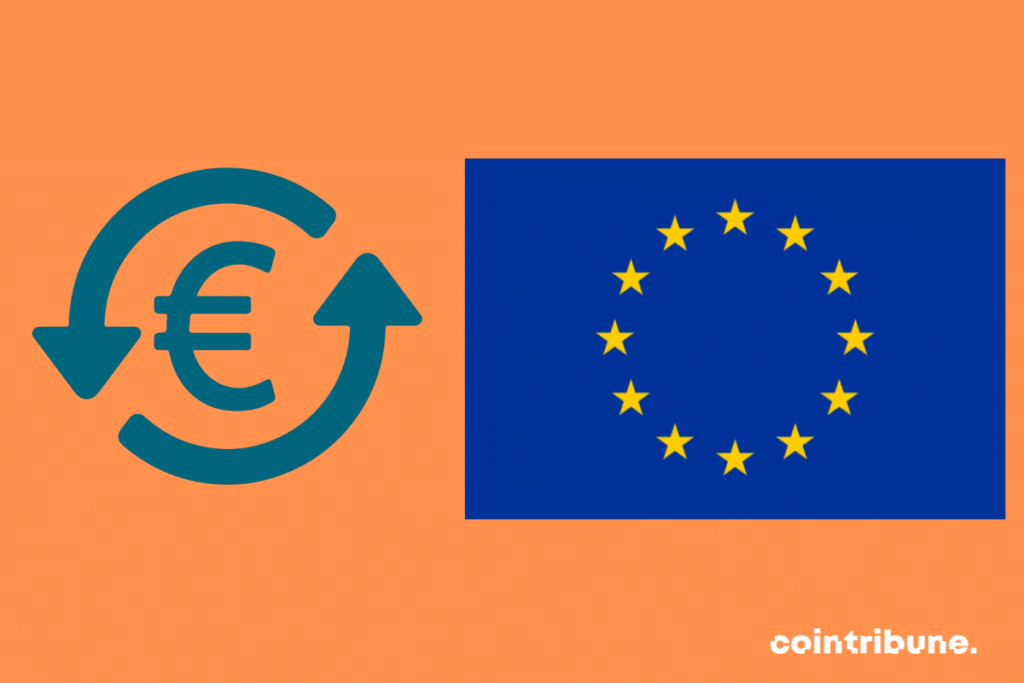Crypto and Europe: Two Organizations Advocate for Non-Traceable Transactions
Ensuring that the digital euro doesn’t become a tool for surveilling Europeans. This is, in a way, the wish of the European Data Protection Board (EDPB) and the European Data Protection Supervisor (EDPS). These entities have recently called on the EU to establish a “privacy protection threshold” for cryptographic transactions in the euro. Let’s take a closer look!

A lack of monitoring of small crypto transactions?
The BIS, through its Atlas project, wants to keep a constant eye on various crypto transactions carried out on major exchanges and well-known blockchains. Unlike the central bank of central banks, the EDPB and the EDPS, both independent bodies from the European Union, issued a joint opinion on the proposal for the regulation of the European Parliament and the Council on the creation of the digital euro.
In other words, their recommendations do not currently concern cryptocurrencies but rather the alternative to fiat that the ECB holds dear: the digital euro.
Context: The digital euro, or digital euro, is a central bank digital currency (CBDC) developed by the European Central Bank to provide Europeans with an alternative or complement to fiat money. With this new type of digital money, it is possible to make online and offline payments. Currently, the ECB places this project in the preparatory phase, with the investigative phase having come to an end.
Combining the digital euro, an asset that is not entirely anonymous according to Christine Lagarde, with confidential data protection is not utopian, according to the two organizations. Moreover, this concept of privacy should not be separated from the design of the digital euro.
“A high level of privacy and data protection is essential to gain the trust of citizens in this new digital currency,” says Irene Loizidou Nicolaidou, vice president of the EDPB.
Hence the introduction of a “privacy threshold” in all forms of digital transactions. Thus, anything involving money transfers (crypto, CBDC, etc.) below this threshold should not be subject to accusations of money laundering or terrorism.
Suspicion surrounds the idea of a single access point.
The EDPB and the EDPS also addressed another crucial point in their recently issued opinion. It concerns the establishment of a single access point whose purpose is to check for any exceeding of individual limits on e-euro holdings. This should be facilitated by verifying the identities of digital euro holders to whom such a limit has been imposed.
Is this to establish an effective system for controlling the wealthy and the less privileged in CBDC? Those who have opted for bitcoin (BTC) and other cryptocurrencies have bet on these technological innovations to avoid this kind of pressure, in any case.
In this regard, our two organizations suggest “evaluating whether a single access point is necessary and proportionate, highlighting that technical measures allowing for decentralized storage of these identities are possible as an alternative.”
For crypto enthusiasts, the era of absolute control and totalitarianism seems to be over. Already, the practices of banks imposing astronomical fees for currency holdings and transactions have not helped for centuries. And the stories of strict controls, often motivated by an anti-cybercrime and anti-terrorism fight lacking restraint, disgust crypto enthusiasts. It’s not just Hamas and the Lazarus Group in the crypto sphere.
Maximize your Cointribune experience with our "Read to Earn" program! For every article you read, earn points and access exclusive rewards. Sign up now and start earning benefits.
La révolution blockchain et crypto est en marche ! Et le jour où les impacts se feront ressentir sur l’économie la plus vulnérable de ce Monde, contre toute espérance, je dirai que j’y étais pour quelque chose
The views, thoughts, and opinions expressed in this article belong solely to the author, and should not be taken as investment advice. Do your own research before taking any investment decisions.